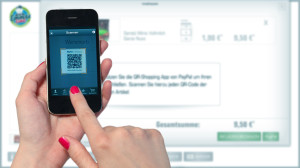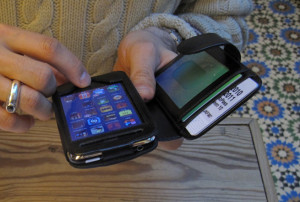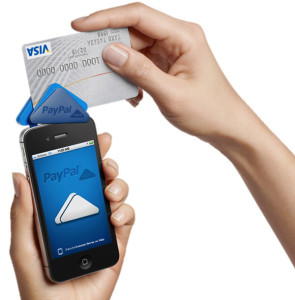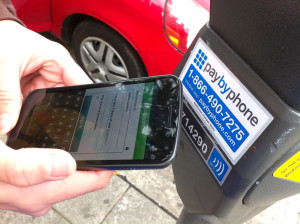September 30th, 2013 by Elma Jane
Facebook this week began testing a new feature dubbed “Autofill with Facebook” that aims to simplify mobile purchases by filling in customers’ credit card information for them, thus eliminating the need to type it in each time. This “Autofill with Facebook gives people the option to use their payment information already stored on Facebook to populate the payment form when they make a purchase in a mobile app,” Facebook spokesperson told the E-Commerce Times. “The app then processes and completes the payment.” The feature “is designed to make it easier and faster for people to make a purchase in a mobile app by simply pre-populating your payment information.”During the test period, which began Monday evening, the feature will show up only to Facebook users who have already provided credit card information to the social network — in other words, those who have made in-game purchases or bought gifts for friends.
Facebook has partnered with PayPal, Braintree and Stripe as financial partners on the service, which is initially available only on the e-commerce iOS apps JackThreads and Mosaic.
Ironing Out the Wrinkles Autofill with Facebook isn’t a move to compete with PayPal and credit card companies, but to complement payment services by adding a layer for convenience, much the way Facebook, Google and Amazon have created a single login that works across a network of websites.
“Facebook is not interested in being a payments company,” an analyst, told the E-Commerce Times. “Instead, it is aiming to be the entity that irons out bumps in the payment process — something it is well-positioned to do. “With Autofill, Facebook will act as the lubricant that makes the commerce experience more seamless, providing a number of benefits to all stakeholders.”
Partners in the deal ensure that Facebook will succeed in Autofill with Facebook, it doesn’t care about payments, it cares about reaping the benefits that come from making the payment experience better.”
‘The Potential to Be Lucrative’ There could be significant financial benefits as well. “This approach has the potential to be lucrative for Facebook in that it will help plug the mobile conversion gap,” McKee suggested. “If Facebook can prove to its partner merchants that an ad on its site led to a purchase, the validity of its platform can easily be proven. Ideally, this will help convince other companies to advertise with Facebook as well.”
Taking it a step farther, Facebook will also gain transaction data, which McKee believes has considerable value. “Facebook can leverage transaction data with what it already knows about us for precision ad targeting. This will increase the relevance and placement of ads on Facebook.”
The Security Factor While many mobile customers will appreciate the Autofill function, security issues still lurk in the back of every consumer’s mind. Yet while privacy concerns have been an ongoing issue for Facebook, it has a good track record where security is concerned. “Facebook has been relatively incident-free when it comes to security breaches.” “However, this is more a problem of consumer perception. Will consumers feel comfortable storing their payment credentials with a social media platform?
“Facebook is already approaching ‘big brother’ status, and this takes it one step further.” “To succeed, Facebook must provide visibility into what it plans to do with transaction data.”
‘It’s a No-Brainer’ The convenience factor, meanwhile, could be a compelling one for consumers. “It’s no-brainer useful to mobile users…who wants to enter their credit card on a mobile phone more than once?” “It could be more secure than mobile payment alternatives.” If Facebook gets past its hurdles, it will also succeed in building strengths in areas where it has been lacking to date.
“Right now Facebook isn’t super strong at the conversion side of e-commerce.” “Autofill will give them a lot of data about purchases, which might help them remedy that.”
‘Strategic Smarts and Ambition’ As for those benefits to Facebook, there are potentially many. One example,”Autofill admits them to the online payments world.”
“This is another example of the strategic smarts and ambition of Zuck.” “One gets the sense that he wants to be a major competitor for everything online.”
Posted in Credit card Processing, Credit Card Security, Digital Wallet Privacy, e-commerce & m-commerce, Electronic Payments, Mobile Payments Tagged with: Amazon, commerce, credit card, e-commerce, Facebook, google, media, mobile, mobile phone, network, payment, payment information, payment services, PayPal, platform, processes, secure, social, transaction
September 30th, 2013 by Elma Jane
Future of Marketing Lies in Mobile Payments…Why?
Marketing and payments might seem like strange bedfellows to the average retailer, but in fact, they are converging rapidly to bring more value to consumers and merchants alike. Here are 10 reasons why the future of marketing is inextricably linked to payments innovation:
1. Cross-Platform Acceptance
Better yet, these targeted offers can be acquired and redeemed through different mediums…online, offline and mobile…and utilized interchangeably. This makes life easier on the consumer and thus makes them more likely to engage with new loyalty and rewards programs. Moreover, as the Internet and mobile solutions continue to merge, the digital “wallets” that many of us use online today (think PayPal) are, logically, moving to our phones. When these payment and marketing applications are accessible from the same device, customers can seamlessly receive pertinent offers and pay for goods at the same time in the same place. Other apps will give consumers the ability to shop in one medium and buy in another, simplifying omni-channel marketing to affect commerce across all channels. This kind of convenience and value is a win for both customer and merchant.
2. Loyalty and Rewards get Simpler
The reality is that it’s much easier to issue and redeem loyalty rewards, gift cards and discounts when they are integrated into the POS experience and don’t require customers or merchants to alter the existing in-store purchase or checkout stream. You can see these simplified applications already in practice at chains like Starbucks, as well as independent merchants that use systems like LevelUp.
3. Merchant adoption
The payment technologies that succeed will be the ones that are ultimately adopted by merchants, which in turn will lead to consumer usage. Key technologies that will likely facilitate widespread adoption of mobile payments…either proactively because merchants want to see what they can offer them, or passively as they upgrade devices…include:
EMV (chip and pin), which will force merchants to update their POS systems, likely catalyzing them to update all points of interaction.
NFC – Cloud Computing – Geofencing – QR Codes and even Basic Bar Codes
4. More Value for Consumers
And for consumers, the convergence of payments and marketing should deliver highly valuable deals, offers, comparisons information and more, ultimately providing drastic improvement of the buying and shopping experience.
5. More Value for Merchants
So what does this value look like? For merchants, the convergence of payments and marketing should bring in new customers, increase sales from existing customers, and provide more customer data. It should also create a more streamlined multi-channel experience so consumers have little barrier to adoption.
6. No Single Technology will Win
These new technologies introduce an interesting question: What should merchants do to prepare for this brave new world where payments and marketing collide? For one, merchants should avoid betting on any one technology. In fact, the POS needs to morph into something a little more complex, becoming instead a POI, where a broad variety of payment types, loyalty programs, coupons and more can be redeemed. Merchants should be in a position to choose what types of payment they want to accept and in what medium, and not be limited to fixed payment tenders.
When the convergence of marketing and payments will happen
The increasing adoption of mobile payments by merchants and consumers, when combined with new POS environments, will jump-start the convergence of marketing and payments. However, we’re still in the early stages.
Mobile commerce technologies are widespread but still working to gain traction from consumers en masse. Additionally, merchants haven’t yet felt the need to upgrade their POS systems to accept mobile payments
However, the October 2015 EMV Liability Shift, a date set by Visa and MasterCard for certain charge-back liabilities to fall to the merchant unless they have upgraded to EMV-capable POS systems, is likely to push merchants to upgrade their systems.
Once merchants begin to upgrade these POS systems, the smart ones will take the opportunity to add more features and functionality to the systems, including the ability to accept payment…and marketing-driven solutions from mobile handsets. That’s when we’ll see the value of two-way communication between merchants and consumers dramatically change the shopping experience and bring payments into the marketing mix.
7. Smartphone Adoption is Speeding Up
Consumers’ mobile phones are already equipped to deliver highly valuable offers, and adoption is increasing at a rapid pace. Smartphones bring with them new app technologies that include not only mobile payments but also loyalty and rewards programs that are designed to drive preference for stores, good and services.
8. Targeted Offers and Single-Use Applications
Of course, these solutions are still in their infancy. Elegant single-use applications, such as mobile wallets and gift cards, will soon grow to provide highly targeted offers that take into account everything from shopping preferences to location, providing incentives as a customer walks the aisle of a store. Just about every player in the payments ecosystem is thinking about these new commerce technologies. The winners will be those that demonstrate clear value for both the merchants and customers.
9. The “POS” is now a “POI”
A point-of-sale (POS) solution used to be a place where goods were purchased and money traded hands. Usually, this took the form of a cash register or credit card machine. Though these still exist, a wave of new value-added marketing services, such as targeted offers, discounts and highly valuable loyalty applications, have led to the transformation of the POS into a point-of-interaction (POI), a place where consumers and merchants meet to exchange value for value.
10. Two-way communication
When embedded in smartphones, new technologies…like near-field communication (NFC), QR codes, geofencing and cloud authentication solutions…allow for two-way communication between the consumer and the POS solution, enabling merchants to deliver coupons and offers directly to customers’ mobile phones through targeted integrated programs.
Posted in Digital Wallet Privacy, e-commerce & m-commerce, Mobile Payments, Mobile Point of Sale, Smartphone Tagged with: bar codes, cloud, device, EMV, handsets, innovation, loyalty, marketing, merchants, mobile, nfc, offline, omni-channel, online, payments, PayPal, phones, POI, point of interaction, POS, qr codes, rewards
August 16th, 2013 by Admin
Facebook is doing early testing of a payment system to store credit card data and processes transactions through PayPal or other merchant service providers including Stripe or Braintree. Facebook would store credit card data for use in purchases in Facebook Gifts and games played on Facebook. The thought behind the move being that it makes it easier for people to make mobile transactions on third party apps giving strength to their advertising platform.
In a statement, Facebook said…
“We are working on a very small test that gives people the option to use their payment information already stored on Facebook to populate the payment form when they make a purchase in a mobile app. The app then processes and completes the payment. The test is designed to make it easier and faster for people to make a purchase in a mobile app by simply pre-populating your payment information. It will be a very small test with 1-2 partners. Additionally, this test does not involve moving the payment processing away from an app’s current payments provider, such as Paypal. We continue to have a great relationship with our payment processing partners, and this product is simply to test how we can help apps provide a simpler commerce experience.”
This marks a bold move whether or not Facebook is actually conducting the transaction itself. Higher conversion rates on their advertising for app developers and advertisers. Mobile Wallets have a proven success for the likes of Amazon, Apple and Google where repeat transactions are the norm. The move could signal that Facebook is looking to move further into e-commerce and digital transaction payments and to buy or build their own payment processing division. It’s also a signal that digital identity and verification could be on the horizon.
Combined with the data Facebook already knows about its users, the company could store things like clothing sizes, shoe sizes, travel itineraries, music or event preferences and much more. This could be a catalyst to send that data automatically to vendors at the point of sale. Things like email addresses are already shared to third party apps if you allow them to. Loyalty rewards might be offered to users to allow the data to be shared with vendors for deeper demographic information.
In addition to mobile payments, Facebook has experimented with virtual currency transactions with its Facebook Credits initiative. They exited the strategy because mostly because developers moved to other virtual currencies like BitCoin and LiteCoin. Recently Facebook Gifts lets users send one another physical gifts and presents a gift suggestion when it notifies users of a birthday. Pulling down the barrier and simplifying a complicated transaction could make it a boon to retailers looking toward mobile payment processing.
Posted in Digital Wallet Privacy, Electronic Payments, Mobile Payments, Mobile Point of Sale Tagged with: digital, electronic, Faceboo, mobile payment, mobile wallet, PayPal, Stripe
August 13th, 2013 by Admin
MasterCard who has endorsed Google Wallet on the Sprint network will now endorse the ISIS network for mobile wallet solutions. Both Google and Sprint have not joined ISIS and it is interesting to see card issuers invest in both platforms. With Verizon, AT&T and T-Mobile in alliance with ISIS, could Sprint be next? Google? Well count Visa and MasterCard as Isis partners. After securing American Express both Visa and MasterCard will now have their credit cards available in Isis’ Wallet. What will be in your mobile wallet?
Many mobile wallet providers are looking at the various options for electronic transaction processing. Will NFC beat out all the others? It’s hard to say but with Apple having yet to release an iPhone model with the chip on board, it could be a yet unseen technology that wins out. QR Codes and Carrier billing are gaining traction for devices without NFC installed and SmartSD cards are coming equipped with NFC to extend devices that have a card slot available.
With device limitations, mobile wallets are still in flux. There are approximately 5 different types of mobile wallets today. There are digital bank accounts similar to prepaid credit cards offered by banks and mostly used for person to person or P2P payments. Mobile payment apps that link payment accounts like those offered by Starbucks or PayPal. Card containers like Apple Passbook store credit cards and loyalty rewards card information and can even fill in forms requesting that information. Similarly, Credential and Card containers store credit card and loyalty rewards but also store identity credentials.
True mobile wallets directly mimic a physical wallet and allow the customer to chose between various credit cards, debit cards even electronic benefits transfer or EBT cards at the point of sale. These wallets are typically app based for both iPhone and Android smartphones and tablets. These wallets can link account information to a point of sale terminal via NFC or other methods for a secure electronic transaction.
Branding and Banks
In recent times Visa, MasterCard and American Express signs at the point-of-sale was a branding element designed to instill confidence for the consumer. With digital wallets becoming the interface for payments, this branding may fade into the background. Yet payment card issuers find themselves in a precarious position. The big three are participating in multiple digital wallet programs in order to not be excluded. This early in the game there are multiple movers and shakers like Square, PayPal, Lemon, Google and now banks and cellular carriers getting into the game, no one knows who consumers and merchants will eventually prefer over the others. It’s like a wait and see game that forces them to play. As banks enter the arena they are favored to win because of the solid loyalty they enjoy from their customers. Though they may not be fair in other categories, they win the security of their customers.
Posted in Credit card Processing, Digital Wallet Privacy, Electronic Payments, Mobile Payments, Mobile Point of Sale, Near Field Communication, Point of Sale, Smartphone, smartSD Cards, Visa MasterCard American Express Tagged with: American Express, Android, Apple, AT&T, google, Iphone, ISIS, MasterCard, PayPal, Square, Starbucks, T-Mobile, Verizon, Visa MasterCard American Express
August 12th, 2013 by Admin
Small businesses are gaining traction in the mobile payment landscape. Mobile credit card readers attached to a smartphone or tablet now account for billions of dollars in m-commerce sales. “Together, mobile and social are transforming the way SMBs acquire and retain customers, With the heavy use of social media, SMB marketing is quickly becoming a two-way engagement rather than a one-way promotion.” Said Steve Marshall of BIA/Kesley. As more people switch to and upgrade their smartphones, AT&T, Verizon and T-mobile are looking to partner with digital wallet provider Isis. Read more of this article »
Posted in Credit Card Reader Terminal, Credit Card Security, Digital Wallet Privacy, Electronic Payments, Mobile Payments, Near Field Communication, Smartphone Tagged with: American Express, biometrics, electronic payments, iPhones, m-commerce, mobile, PayPal, recognition, Smartphones, Square
August 6th, 2013 by Admin
In Canada, the game to corner mobile payment systems and the Digital Wallet is being played seriously. PayPal and Square are present but the 800 pound gorilla may have just entered the ring. Canadian banks are presenting merchant accounts capable of handling tap to pay transactions competing directly with Square and PayPal. Royal Bank of Canada has launched a mobile payment solution to provide contactless payment using Near Field Communication (NFC) enabled smartphones and tablets. Shoppers can simply wave their smartphone over a cash register or payment terminal and be on their way. No more swiping a credit card into a terminal or punching keys into a terminal and no more fumbling with cash or coins to settle a payment. Read more of this article »
Posted in Credit card Processing Tagged with: bank, bankers, blackberry, Canada, Canadian, Canadian travel agency agents, digital, electronic, financial services, ipad, Iphone, mobile, nfc, payments, PayPal, Rogers Communications, Royal Bank, smartphone, Square, tablet, travel
In discussions about merchant service providers, Square and PayPal entering talks is a given. Sqaure offers free credit card readers to entice merchants to switch their credit card processing to them. PayPal recently launched an initiative to expand it’s reach into retail stores and offers to waive processing fees through 2013. With the coming rush to mobile transaction processing more companies are entering the fray. AT&T, Verizon, T-mobile and Sprint are looking to get into the credit card transaction processing gig as they already carry that data over their cellular networks. ISIS Wallet and Google’s digital wallet bring credit card transactions to Android smartphones and tablets, and Visa is expected to launch its Visa Ready program as it rolls out test merchants. Read more of this article »
Posted in Mobile Payments Tagged with: Android, bluetooth, Chip & PIN, credit card processing, Digital Wallet, EMV, fees, google, ISIS, m-commerce, merchant, merchant account, nfc, payment processor, PayPal, Rates, Square, transactions, Visa MasterCard American Express




